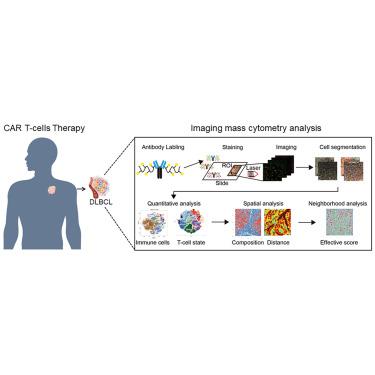当前位置:
X-MOL 学术
›
Mol. Ther.
›
论文详情
Our official English website, www.x-mol.net, welcomes your feedback! (Note: you will need to create a separate account there.)
High-multiplex single-cell imaging analysis reveals tumor immune contexture associated with clinical outcomes after CAR T cell therapy
Molecular Therapy ( IF 12.4 ) Pub Date : 2024-03-19 , DOI: 10.1016/j.ymthe.2024.03.023 Jin Jin , Li Lin , Jiao Meng , Lijun Jiang , Man Zhang , Yuekun Fang , Wanying Liu , Xiangke Xin , Xiaolu Long , Dong Kuang , Xilai Ding , Miao Zheng , Yicheng Zhang , Yi Xiao , Liting Chen
Molecular Therapy ( IF 12.4 ) Pub Date : 2024-03-19 , DOI: 10.1016/j.ymthe.2024.03.023 Jin Jin , Li Lin , Jiao Meng , Lijun Jiang , Man Zhang , Yuekun Fang , Wanying Liu , Xiangke Xin , Xiaolu Long , Dong Kuang , Xilai Ding , Miao Zheng , Yicheng Zhang , Yi Xiao , Liting Chen

|
Chimeric antigen receptor (CAR) T cell therapy has made great progress in treating lymphoma, yet patient outcomes still vary greatly. The lymphoma microenvironment may be an important factor in the efficacy of CAR T therapy. In this study, we designed a highly multiplexed imaging mass cytometry (IMC) panel to simultaneously quantify 31 biomarkers from 13 patients with relapsed/refractory diffuse large B cell lymphoma (DLBCL) who received CAR19/22 T cell therapy. A total of 20 sections were sampled before CAR T cell infusion or after infusion when relapse occurred. A total of 35 cell clusters were identified, annotated, and subsequently redefined into 10 metaclusters. The CD4 T cell fraction was positively associated with remission duration. Significantly higher Ki67, CD57, and TIM3 levels and lower CD69 levels in T cells, especially the CD8/CD4 Tem and Te cell subsets, were seen in patients with poor outcomes. Cellular neighborhood containing more immune cells was associated with longer remission. Fibroblasts and vascular endothelial cells resided much closer to tumor cells in patients with poor response and short remission after CAR T therapy. Our work comprehensively and systematically dissects the relationship between cell composition, state, and spatial arrangement in the DLBCL microenvironment and the outcomes of CAR T cell therapy, which is beneficial to predict CAR T therapy efficacy.
中文翻译:

高多重单细胞成像分析揭示肿瘤免疫环境与 CAR T 细胞治疗后临床结果相关
嵌合抗原受体(CAR)T细胞疗法在治疗淋巴瘤方面取得了巨大进展,但患者的治疗效果仍然存在很大差异。淋巴瘤微环境可能是影响CAR T疗法疗效的重要因素。在这项研究中,我们设计了一个高度多重成像质谱流式细胞仪 (IMC) 组合,可同时量化 13 名接受 CAR19/22 T 细胞治疗的复发/难治性弥漫性大 B 细胞淋巴瘤 (DLBCL) 患者的 31 种生物标志物。在CAR T细胞输注前或输注后出现复发时,总共采集了20个切片。总共识别、注释了 35 个细胞簇,随后将其重新定义为 10 个元簇。 CD4 T 细胞分数与缓解持续时间呈正相关。在预后不良的患者中,T 细胞(尤其是 CD8/CD4 Tem 和 Te 细胞亚群)中的 Ki67、CD57 和 TIM3 水平显着升高,而 CD69 水平显着降低。含有更多免疫细胞的细胞邻域与更长的缓解时间相关。在 CAR T 治疗后反应差且缓解期短的患者中,成纤维细胞和血管内皮细胞与肿瘤细胞的距离更近。我们的工作全面、系统地剖析了DLBCL微环境中的细胞组成、状态和空间排列与CAR T细胞治疗结果之间的关系,这有利于预测CAR T治疗疗效。
更新日期:2024-03-19
中文翻译:

高多重单细胞成像分析揭示肿瘤免疫环境与 CAR T 细胞治疗后临床结果相关
嵌合抗原受体(CAR)T细胞疗法在治疗淋巴瘤方面取得了巨大进展,但患者的治疗效果仍然存在很大差异。淋巴瘤微环境可能是影响CAR T疗法疗效的重要因素。在这项研究中,我们设计了一个高度多重成像质谱流式细胞仪 (IMC) 组合,可同时量化 13 名接受 CAR19/22 T 细胞治疗的复发/难治性弥漫性大 B 细胞淋巴瘤 (DLBCL) 患者的 31 种生物标志物。在CAR T细胞输注前或输注后出现复发时,总共采集了20个切片。总共识别、注释了 35 个细胞簇,随后将其重新定义为 10 个元簇。 CD4 T 细胞分数与缓解持续时间呈正相关。在预后不良的患者中,T 细胞(尤其是 CD8/CD4 Tem 和 Te 细胞亚群)中的 Ki67、CD57 和 TIM3 水平显着升高,而 CD69 水平显着降低。含有更多免疫细胞的细胞邻域与更长的缓解时间相关。在 CAR T 治疗后反应差且缓解期短的患者中,成纤维细胞和血管内皮细胞与肿瘤细胞的距离更近。我们的工作全面、系统地剖析了DLBCL微环境中的细胞组成、状态和空间排列与CAR T细胞治疗结果之间的关系,这有利于预测CAR T治疗疗效。



























 京公网安备 11010802027423号
京公网安备 11010802027423号